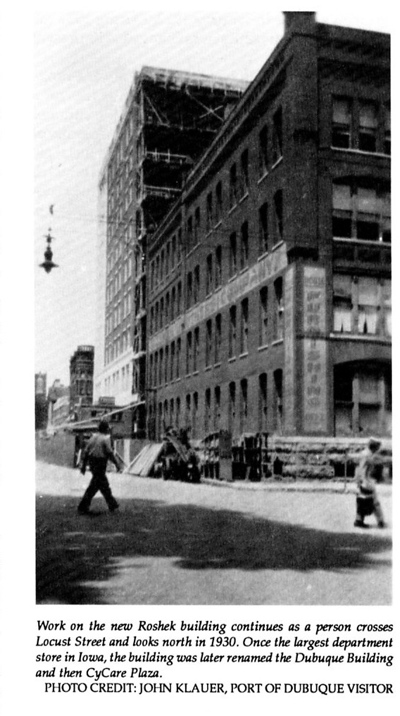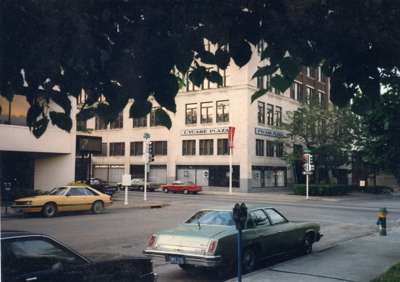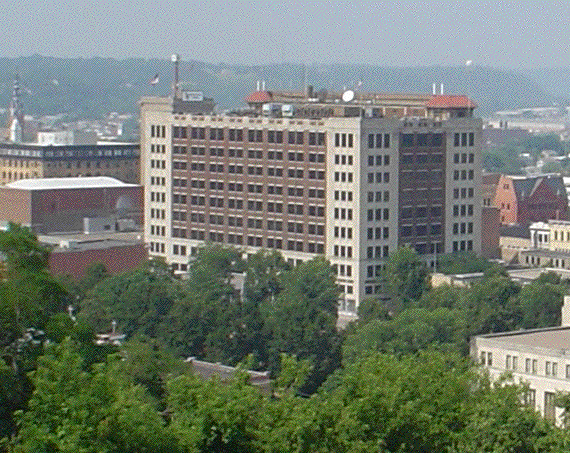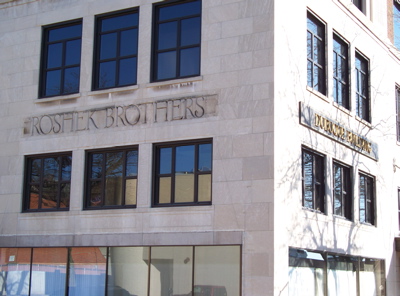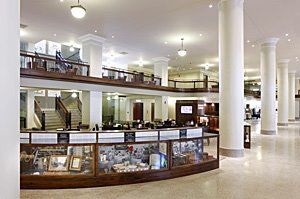Encyclopedia Dubuque
"Encyclopedia Dubuque is the online authority for all things Dubuque, written by the people who know the city best.”
Marshall Cohen—researcher and producer, CNN
Affiliated with the Local History Network of the State Historical Society of Iowa, and the Iowa Museum Association.
DUBUQUE BUILDING
DUBUQUE BUILDING. ROSHEK'S DEPARTMENT STORE was once the largest department store in Iowa. The completion of the building in July 1931 at a cost of $1.5 marked the end of one of Dubuque's most unique construction projects. The northern half of the building was built first. A four-story structure housing part of the department store remained in operation at the southern end of the block adjacent to 7th Street. When the construction of the northern end was completed, the older building was demolished, and the southern half of the new building was completed.
The nine-story Dubuque landmark in its peak years was a full-service department store. It was also a popular meeting place for lunch. The "Packet Room" featured marble-topped tables.
In 1968 Rosheks announced its plans to move to KENNEDY MALL. Nearly two years later, Edward SHEPPLEY of W. S. Sheppley and Company announced the purchase of the building with plans to offer office space on upper floors and a potential department store in the near future. The building cost Sheppley $800,000 and the land another $400,000. The structure was renamed the Dubuque Building, and nearly $5 million in renovation was begun at a time when URBAN RENEWAL was well underway in the downtown area. New elevators, heating and air conditioning systems were installed and a pedestrian mall was constructed on the first floor.
Advertising the Dubuque Building as "making downtown...uptown," the Dubuque Building became an office complex with the exception of the lower three levels which were kept for department store space. In 1971 W. S. Sheppley and Company proposed to offer an alternative to DUBUQUE COUNTY COURTHOUSE and DUBUQUE CITY HALL renovations. The Sheppley Company offered to lease one floor of the Dubuque Building each to the city and county governments at a maximum rent of $60,000 annually for a ten-year lease. (1)
In 1984 W.S. Sheppley and Company filed for protection under Chapter 11 bankruptcy proceedings. On August 4, 1986 the Dubuque Building was sold to its largest tenant, CYCARE SYSTEMS, INC., for $5.7 million. The company used the space to house its corporate headquarters and data processing center.
In 1992 CyCare announced that it would seek a buyer for the building that had become known as CYCARE PLAZA. It stated that the building could attract buyers at a price from $10 million to $12 million. In January 2000 CyCare Plaza was renamed the Dubuque Building following the purchase of Cycare by HBO & Co. and its merger with McKesson Corporation.
On January 25, 2008 McKesson, a Fortune 20 health-care services company with revenues of $93 billion, announced that it would reduce its Dubuque operation and sell the building. In November of that year Dubuque Initiatives purchased the Dubuque Building from McKesson for reportedly $450,000. (2)
In 2009 city officials announced that IBM would relocate their Dubuque operations to the Dubuque Building bringing hundreds of jobs to the city at an average salary of $45,000. (3) The potential positive impact of the announcement included $120 million in employee costs and 1,300 jobs. In the first month Accessdubuquejobs.com and IBM's website had more than 500,000 "hits." (4)
The relocation, however, depended upon incentives. It was estimated that nearly $14 million would come from the state, $5.5 million million from the city, and $24.5 million from the quasi-public group Dubuque Initiatives. The money from Initiatives would cover the costs of purchasing and renovating the Dubuque Building. The group's 20-year loan would be guaranteed by the city. Dubuque-area banks and credit unions agreed to finance construction costs and any long-term debt remaining after grants and credits applied for had been received. The city's portion included a 20-year property tax rebate ($1.8 million to IBM, $1.75 million to Dubuque Initiatives) and ten years of free shuttle bus service to PARKING at the PORT OF DUBUQUE together with a forgivable loan and a GREATER DUBUQUE DEVELOPMENT CORPORATION staff person to support recruitment efforts. (5)
Dubuque Initiatives was the nonprofit semi-private organization that financed the restoration project which totaled more than $50 million. The resulting renovation of the Dubuque Building demonstrated state-of-the-art examples of sustainability as materials were carefully reused and waste kept to a minimum. The renovation also included the installation of energy-efficient HVAC systems and low-flow restroom fixtures, the use of day-lighting techniques and automatic light sensors, the use of low-VOC paints and adhesives and the incorporation of green-building operations techniques.
The developers were aiming for a silver designation in the U.S. Green Building Council’s Leadership in Energy and Environmental Design program after finishing their overhaul of the former downtown department store. The project ended up with a platinum award, the highest LEED level that can be obtained. The project was assessed on sustainability, energy efficiency, water savings, materials selection and indoor environment quality. The award indicated the project was among the top 2 percent of energy-efficient buildings in the country, according to Gronen Restoration, which headed up the project.
The Roshek Building project was the first to achieve LEED platinum certification in the city of Dubuque and one of just four across Iowa. All of the other LEED platinum projects across the state were for new construction, according to Gronen Restoration.
IBM was awarded LEED gold certification for a commercial interior, which Tom Coffas said fit with that company's focus on being environmentally friendly. Coffas, the Dubuque delivery center executive site director for IBM, noted the company's global sustainability efforts in the Smarter Planet program and the local equivalent, Smart Sustainable Dubuque.
The building was for many years the site of MERCY'S FESTIVAL OF TREES.
By 2017 the occupancy of the Dubuque Building had dropped significantly. Manna Java, a popular coffee stop and restaurant, closed after a fifteen year lease expired. Among the causes of the closing were a lack of parking and a sharp decline in the number of IBM employees from 1,300 to less than 500. Manna Java outlasted Marcella, a gift shop, which had a five year lease. American Bombshell, a restaurant, opened in 2016, to occupy the former site of Bejing Grill when moved out the same year. (6)
On November 29, 2019 the announcement was made that the Dubuque Building had been purchased from Dubuque Initiatives by two of the city's most robust businesses. COTTINGHAM AND BUTLER, INC. and HEARTLAND FINANCIAL USA, INC. formed a partnership entity--Rosek Property LLC--that would purchase the nine-story city landmark from DUBUQUE INITIATIVES for an estimated $12 million. The partnership would then spend at least $2.85 million on improvements and in the process create at least thirty-two full-time positions. Both business already had a presence in the building. Cottingham & Butler occupied the fourth, fifth and Heartland occupied the third floor and part of the fourth. In their plans, Cottingham & Butler would occupy the seventh and eighth floors while Heartland would occupy the third, fourth and fifth. IBM in 2019 occupied the sixth and ninth floors with business and non profit tenants occupying the first and second floors, mezzanine and basement. Part of the agreement called upon the city to build a new 500-space parking structure. (7)
In December, 2020 Dubuque Council members voted 7-0 to approve an amendment to the development agreement. The agreement extended the deadline for the city to construct a new parking facility, changed the agreement's job growth requirements, and removed the restrictions on how the building could be improved. Under the new plans, the construction of the new parking facility was extended from 2022 to 2023. The job growth language no longer required employees to physically work at the Dubuque Building full-time as long as they had a designated work place in the building. Language on requirements how the new owners could improve the building were also changed.
--- A technical error resulted in the loss of the footnotes. These are being researched.
Sources:
1. Fyten, David; Bill Knee; Jim Miller, "Renovate? Lease? Buy? Build? Do Nothing?, Telegraph Herald, April 29, 1973, p. 4A
2. Mozinski, Eileen, "Big Blue" Deal Means Big Domino Effect," Telegraph Herald, January 15, 2009, p. 5
3. Mozinski, Eileen, "What's the Cost?" Telegraph Herald, January 15, 2009, p. 5
4. "By the Numbers," Telegraph Herald, February 20, 2009, p. 1
5. Mozinski, Eileen, "1,300 Jobs," Telegraph Herald, January 15, 2009, p. 1
6. Montgomery, Jeff, "Manna Java World Cafe Closes Doors," Telegraph Herald, July 29, 2017, p. 1A
7. Nieland, Grace, "Roshek Vibrancy," Telegraph Herald, September 27, 2023, p. 1A


